Is Our PT Reliable Enough?
Reliability of our public transport is still not good enough.
AKT last week compared Auckland’s April rail performance to Wellington’s - a city painfully suffering constant delays while the network has been upgraded -and Wellington is doing better than Auckland.
Wellington measures trains being late if they are 3 minutes behind schedule. Auckland’s measurement is 5 minutes.
In April 81.9% of all Auckland’s train services arrived at their destination within five minutes of their scheduled time, compared to 80.0% last month and 80.7% in April last year.
That means just over 18% of services were late or did not arrive.
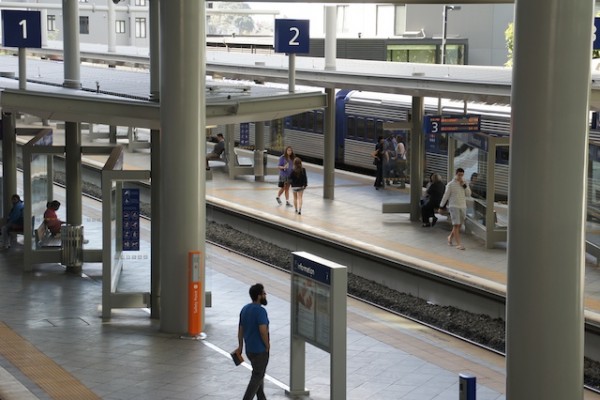
Punctuality trends comparing 2009/10 and 2010/11 are presented below:
But on the ground, it can be a more painful experience for commuters. It only takes a couple of bad experiences in a row and people start to question whether they want to use PT.
Reader Kurt sent in this on how he got on last month using the Eastern line.
“Suffice it to say, pretty poor in the morning,” he says. “There was only one evening service that was disrupted.For me, trains were late (more than 5 minutes) 42% of the time. rather pathetic one would say.”
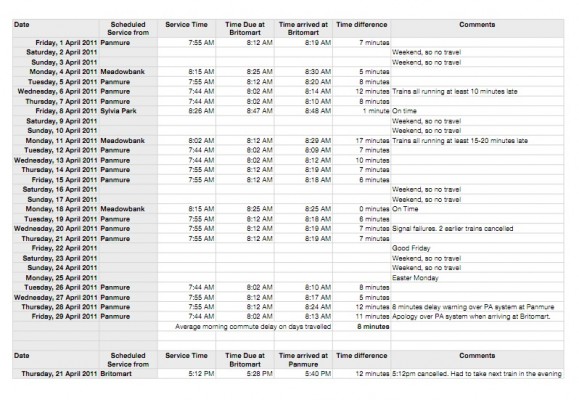
For over a year we have been acknowledging that the ongoing work in preparation for electrification and Rugby World Cup will impact on services - of late those Southern and Eastern line services that Kurt uses.
Auckland Transport says that although most of this work is being performed at night and during times of low demand to limit the number of passengers affected, the work will be continuing over the next few months.
That’s the price of progress as it has been in Wellington.
But the benchmark is still being set too low.
And the overall figure of train delay minutes doesn’t help when customers wait for ages on a station not knowing what is going on - as communication to passengers about what is going on is often poor or erratic - the most common complaint of readers here.
The official story: Auckland Transport say train delay minutes decreased by 23.6% in April to 13,536 minutes. While there were fewer services overall scheduled during the month than in March due to the timing of Easter and several weekends when buses replaced trains for upgrades, the reduction was mainly driven by the improved network conditions that saw a reduction in the number of major disruptive incidents.
Infrastructure delay minutes fell by 28% from last month and were the primary reason for the reduction in delay minutes.
I don’t personally find bus punctuality great - but at least it paints a better picture to encourage PT.
Auckland Transport reports bus service punctuality for April 2011 was 99.2%, measured by the percentage of services which commence the journey within 5 minutes of the timetabled start time. But service punctuality and reliability are self-reported by the bus operators so we have to trust them.
I must just have an unusually bad experience as more than 1% of my buses don’t arrive at all - or on time. But overall they are far more reliable and the perception is so.
Harbour ferries also self-report an almost perfect sailing time.
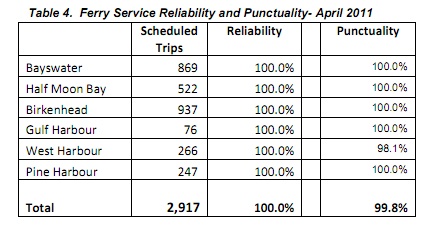
I reported earlier the major problems for rail over April.
- On April 11, a signal fault caused major delays to morning peak services across the network when a fault developed in the interface between the old and new signalling equipment following overnight testing.
- On April 16 a signal cable was cut at Quay Park Junction that resulted in delays to services on the Eastern line (no rail services were scheduled on the southern and Onehunga lines on this day due to upgrade work).
- On the morning of April 20 a signal fault at Newmarket between the hours of 5.30am and 7.00am caused delays and cancellations to morning peak services on the Southern, Western and Onehunga lines.
- In the early hours of April 29, a work train that had been used for overnight network upgrades became disabled between Newmarket and Remuera and caused severe disruptions and cancellations to Southern, Western and Onehunga lines.
- On the morning of April 6 a train was disabled at Papatoetoe in the early hours causing a line blockage which led to extensive delays and cancellations mainly affecting services on the Southern and Eastern lines.
- During the morning peak of April 12, a service departing Britomart was involved in an operational irregularity which resulted in a temporary block on one of the lines in the Britomart tunnel and caused delays and cancellations across all lines through the morning peak.
You have to be philosophical about such things. Issues occur on any train service. But it’s understandable that while things are said to be getting better, we are still only 81% right.
Disruption to the rail network wil go on right through until electric trains start running in 2014. There is no end in sight.

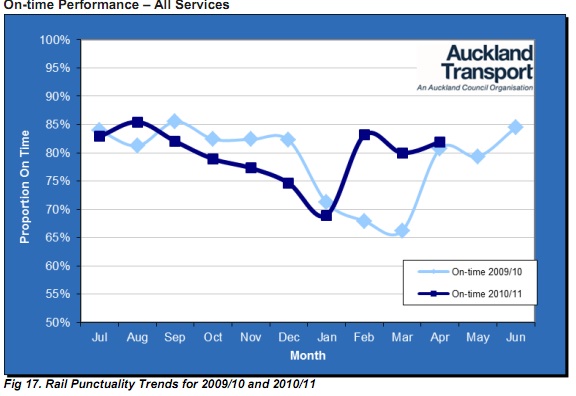
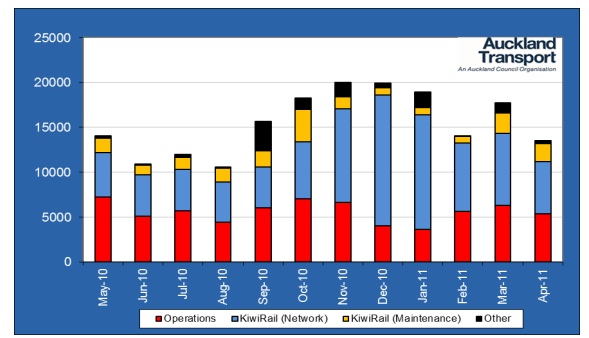
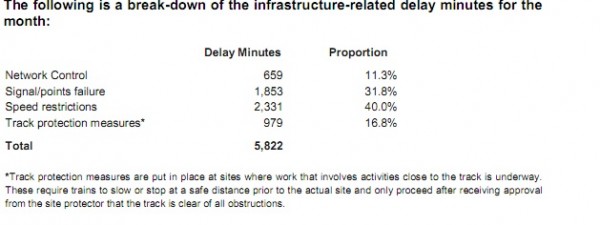
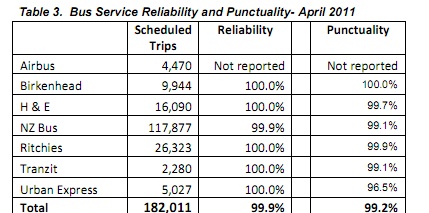










9 Comments
The short answer is NO, it isn’t reliable enough.
My personal experiences out west are probably worse than Kurts, I catch the same train every morning and only once since at least september was it exactly on time and that was only last week. Usually it is 6+ minutes late. The one on time trip was actually noticed by passengers and on my trip home that night I heard others say how amazed they were that the morning train was on time. They were saying how they were so used to it being late they did a double take when they saw the time.
Also bus patronage is based on what the bus companies say and there isn’t actually any independant confrimation of this.
No it isn’t reliable enough, it should arrive within 3 minutes at least 90% of the time, by then, i would think it is reliable enough.
One of the worst things about unreliable timekeeping is the missing of bus to train or in particular train to bus or ferry connections. If the trains are late to a “connecting” bus service at say Britomart you may have to wait 30 minutes for the next bus connection or at worst nearly an hour to some locations. That is not good enough. Understand this may happen once in a while but this can and does happen quite a bit..
For PT to work in a city like Auckland with multiple origin destination permutations this needs to improve significantly so that connections on paper are connections in reality. Understand transit time involved between a platform and a bus stop but a train 10 minutes late will often mean a missed connection to a bus or a ferry. This forces people to build in slack time into their own connection planning often meaning long waiting times for connections and in turn unnecessarily long journey times. I have to say that mostly this seems to be an issue with the trains being late more than the buses or ferries from my own experience although others may have a different experience of course. I guess its a bit of moan but there you are - we are all customers after all. Still its getting better I think.
Higher frequency is more important than punctuality, or at least higher frequency ameliorates poor punctuality. But then to run a high frequency network requires better punctuality or services catch up with each other, something we see all the time on the busy bus routes, but can’t be allowed to happen on a rail system. So, yeah, this has to improve.
As a long time user of Ritchies (West Auckland), I will not hesitate to say that their reliability is absolutely awful. One problem is that their quality of drivers is poor. They sit at the start of their journey (or somewhere else) and don’t leave till it suits them. Base does nothing about as they don’t care. You can try to confront the drivers about it and they will act as if they can’t speak english (heck I won’t be surprised if some can’t). Instead of giving themselves 99.9%, I would give them a low 65%. And just to think that pre 2005 they were even worse. Luckily where I am now I can use GO Wests 087′s and 048/049′s.
I find it really frustrating hearing complaints about a rail system that has been under maintained for many years operating with equipment that is all but obsolete and dealing with on going disruptions that are needed to remedy the situation. Not until the system is upgraded and a modern fleet of electric trains are running would I expect the services that some are expecting now, until then I say a bit of sympathy and patience to the operators and staff is not too much to ask.
Hood - I hear but you and not ripping into anyone trying to fix it, especially the workers and engineers, however it needs to be realised it has been eight long years since the Auckland Rail upgrade started with the opening of Britomart in 2003 and start of the DART projects. I understand your frustration but we are talking from customers perspective and as everyone knows isn’t the customer always right? They don’t care about how things were 10 years ago but how things are today when they are late to work or miss that very important appointment.
Due to poor commitments by funders in the early part of the upgrade there has been so much rework and capital waste - eg new signals put in under DART only to ripped out and replaced as they weren’t electrification compliant a few years later (in some cases a couple of years later) . New tracks laid - only to ripped out because clearances weren’t electrification compliant where they had been laid eg in tunnels under bridges etc etc , new platforms built only to be completely rebuilt again at high cost because they were too short. Some very unfortunate decisions were made early on have cost the Auckland upgrade many millions more than it should have cost and have also added much time to the process than should have been the case. So naturally people are frustrated – but at the same time talk to most and they can see the huge improvements made so bouquets and brickbats I guess.
As I said we are not saying it is the builders fault but someone needs to realise people have been patient and customers are entitled to have a timetable that is reasonably accurate. As for the above rail kit - $100′s of millions have been spent on that rebuilding to near new standard ex BR cars, and ex Perth Railcars - most aren’t that old from early 1980′s and even ADK’s are only late 1960′s - on par with similar rolling stock in other parts of the world. Sure the DC’s are relatively old but they had many $10′s of million spent on them as well and so should be reasonable so I really don’t buy the argument that the equipment is obsolete – otherwise someone has wasted an awful lot of money and needs to be accountable. Engineers have a tendency to gold plate. The English Electrics in Wellington have lasted over 60 years – now that is old and they have been reasonably reliable until recently (last five years or so) and are now nearly replaced.
What has happened is that Auckland Metro rail has been a victim of its own success and perhaps promises made too early. It is getting better and we have come a long way - but I believe it has been a very costly exercise, much more so than it could have been and I note that Auckland Rail is one of the most costly Metros per passenger in the World according to MoT benchmarking at the moment because of this. Wellington on the other hand is one of the Worlds cheaper ones yet reliability is far better and the rolling stock on average even older than Aucklands. Ironically Aucklanders have been much more patient than Wellingtonians about Rail service levels and disruptions to boot not regular front page headlines like you get in the Dominion down in Wellington.
The World Cup will be a big test for Auckland Rail and its timekeeping and let’s hope it all goes well. It should with the nearly $1 Billion spent over the last decade to date. Agree once Electrification is finished should be all good by then – let’s hope so anyway.
I might add that the Builders, Engineers (old Ontrack - now KiwiRail Network, Hillside workshops, Hutt workshops), Contractors, KiwiRail Auckland Metro Maintenance, Veolia, Auckland Transport and its predecessors do have a lot to be proud of in what has been acheived in difficult stakeholder conditions - so don’t be down heartened by it.
We just do, like many times in life, have to keep the pressure on. Many a time we are often measured by our most recent work - but it seems unfair sometimes.
How does the road network compare for reliability? Every time there is a breakdown or accident, do car drivers get in a huff and threaten to never drive again?
Now, if only the train manager would open the doors promptly, and the passengers wouldn’t dawdle, we’d spend less time not moving.